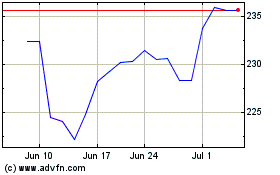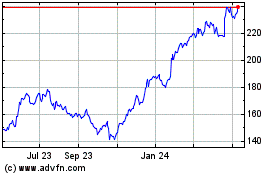Law Firm Cravath Raising Starting Salaries to $180,000
June 06 2016 - 7:00PM
Dow Jones News
New York law firm Cravath, Swaine & Moore LLP is raising
base salaries for its junior-most lawyers by 12.5%, its first
increase in nearly a decade and a move likely to trigger a wave of
similar hikes throughout the legal industry.
As of July 1, new first-year lawyers at the firm will now get
$180,000, up from its longtime standard of $160,000 for law-school
graduates, according to a Cravath memo reviewed by The Wall Street
Journal. The increase lifts pay from there: fourth-year lawyers,
for instance, will make $235,000, and eighth-year lawyers will earn
$315,000. Associates often get year-end bonuses on top of base
salaries.
The increase is likely to spawn copycat moves from Cravath's
competitors. Law firms compete for the same pool of top-tier
graduates, and salary is often viewed as a deciding factor. Large
corporate law firms are often quick to match what market leaders
like Cravath pay.
Already, a few law firm partners indicated on Monday that they
would match. "No doubt we will be raising as will other firms,"
John Quinn, co-founder of litigation powerhouse Quinn Emanuel
Urquhart & Sullivan LLP, said in an email. "This market is very
efficient in that way."
The last major uptick happened in 2007, when Cravath and others
boosted first-year pay 10% to $160,000.
Since then, the market for junior lawyers and the economics of
big law firms have changed. Facing client pushback, law firms are
less likely to charge for the work of first- and second-year
lawyers, making it difficult to justify higher salaries. Profits
have slipped by tightening demand for law firms' services since the
economic downtown.
At the same time, new lawyers face mounting expenses. Law
students frequently graduate with more than $100,000 in debt, and
rent and health-care costs are up in major cities across the
country. Cost of living in the U.S. has risen by a few percentage
points most years since 2007, according to the Social Security
Administration.
The head of one New York law firm said Cravath's pay-increase
timing seemed odd, since salary decisions are usually made at
year-end, but that his firm would match it. Clients facing tight
budgets likely won't view the decision favorably, he said, adding
that "the signal [to the market] is one that I'm glad somebody else
has gone first on."
Kent Zimmermann, a Chicago-based law firm strategy consultant
with Zeughauser Group, said the raises appear to be as much about
holding on to current talent as recruiting new lawyers. "It's a
tough time generally to retain today's best associates," he said.
Many junior lawyers are finding an increasingly difficult path to
the top at big firms and securing attractive job opportunities
outside of such firms.
In recent years, a small group of elite law firms, including
Cravath, have pulled away from the pack and continue to be highly
profitable while others have had a tougher time keeping pace.
Cravath, which counts among its clients J.P. Morgan Chase &
Co., American Express Co., International Business Machines Corp.
and Johnson & Johnson, brought in $666.5 million in revenue
last year, according to the American Lawyer magazine. Its partners
took home average profits of $3.56 million, lower than just five
other U.S. firms.
Nationwide, less than half of new law school graduates take jobs
at law firms, and even fewer land at big corporate firms. The
median salary of 2014 law school graduates was $63,000, according
to the National Association for Law Placement.
Write to Sara Randazzo at sara.randazzo@wsj.com
(END) Dow Jones Newswires
June 06, 2016 18:45 ET (22:45 GMT)
Copyright (c) 2016 Dow Jones & Company, Inc.
American Express (NYSE:AXP)
Historical Stock Chart
From Mar 2024 to Apr 2024

American Express (NYSE:AXP)
Historical Stock Chart
From Apr 2023 to Apr 2024
